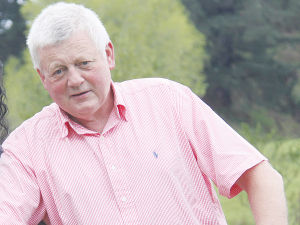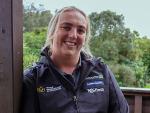Lack of progress in repairing the stretch of State Highway 2 between Wairoa and Napier is angering Wairoa Mayor Craig Little.
It's now 14 months since Cyclone Gabrielle caused multiple slips and washouts and demolished the bridge at Waikare near the settlement of Putorino.
Even before Gabrielle struck, there were plans to build a new road and bridge to avoid the known problems in the Waikare Gorge.
The demolished Waikare bridge has been replaced by a temporary one-way bailey bridge and along SH2, between Wairoa and Napier, there are other slips and washouts, which to the casual observer appear to be taking an age to fix.
Mayor Little can't understand what's holding up progress and is at the end of his tether.
"I am 100 percent frustrated with the Transport Agency. I have written also to the Minister for Infrastructure, and am yet to get a reply, and and the Prime Minister and I am aware that he is concerned. But we just need to get some reality and urgency into the present crisis," he told Rural News.
Little says, if anything, the situation has got worse for people trying to travel between Wairoa and Napier with the way traffic is being managed.
He points to the fact that there are at least nine sets of traffic lights on the road to get people through some of the one-way stretches of the damaged road. He says earlier on some of these were switched off at night, which allowed traffic to get through faster, but this isn't happening now.
The damage to SH2 is massive in some places and the journey from Wairoa to Napier, which would normally take just over an hour, is taking at least double that and, in some cases, up to three hours.
Large rural businesses in Wairoa and further north in Tairāwhiti are now starting to question remaining in the region because of the poor infrastructure and the apparent failure of the politicians and bureaucrats to get their act together. The AFFCO meat processing plant is the major employer in Wairoa and it, like the major commercial growing company Leaderbrand in Gisborne, ship their products by this road to Napier and beyond and get input for their operations via the same route.
"It's all so frustrating," says Little.
The town of Wairoa services a huge farming hinterland and 14 months on, some farmers still have limited access to their properties. They are trying to repair broken fences and damaged farm tracks, but the land keeps on slipping and, for some, permanent repairs are impossible.
Little is a farmer himself and says everyone is doing it pretty hard with low lamb prices, high interest rates and input costs. He says beef is okay but wool prices are terrible.
But if the economies of farming aren't bad enough, the fragility of the road and access to Napier is making life hell for this small, beautiful and prosperous community who feels forgotten by the authorities who are supposed to be fixing the problem.



















